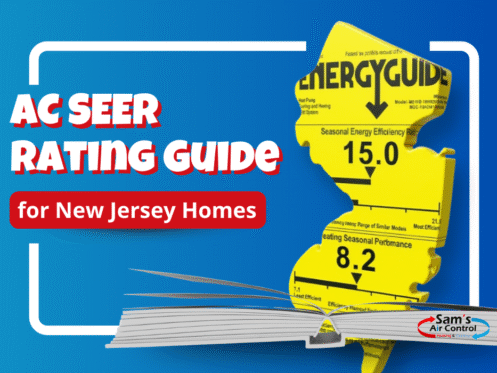When considering a new air conditioner installation, selecting the right SEER rating is important for efficient home cooling. Explore what an AC unit SEER rating means, why it matters, and how you can choose the best SEER rating for your New Jersey home with help from the skilled team at Sam’s Air Control.
What Is a SEER Rating and Why Does It Matter?
SEER, or Seasonal Energy Efficiency Ratio, is a measurement of cooling efficiency. It compares the cooling output of a device over the length of the cooling season, divided by the energy it needs to run (measured in Watt-Hours). The higher the SEER rating, the more energy-efficient the cooling system.
In 2023, the Department of Energy updated SEER to SEER2 to improve standardization and real-world categorization of cooling systems. Most new AC systems will have a SEER2 rating, although some may still list their rating as SEER.
What’s the Best SEER Rating for an AC Unit in NJ?
Generally, a higher SEER rating indicates a more energy-efficient air conditioner. However, higher ratings can also mean a more costly system. Finding the best SEER rating for an AC involves finding a balance between energy efficiency and price point.
According to the Department of Energy’s air conditioner efficiency regions, New Jersey and other northern areas are required to have a minimum SEER rating of 14.0 (or 13.4 under the new SEER2 system). Note that higher SEER ratings are usually considered better, since a more energy-efficient system will save you money in the long run. However, a SEER of 14.0 or SEER2 of 13.4 will provide enough cooling power to keep you comfortable.
How SEER Ratings Impact Energy Bills
An air conditioner with a higher SEER rating uses less energy to deliver the same amount of cooling power compared to a system with a lower SEER rating. Higher SEER ratings can result in savings on your energy bill.
There are two ways to think about how SEER impacts your energy costs.
Lower energy bills
If you want to set your AC at a consistent temperature, then a higher SEER unit provides the same cooling power at a lower cost. This can be helpful when you’re considering investing in a more energy-efficient unit. The long-term cost savings can offset the higher initial cost of the unit.
More cooling power
If you only want to spend a set amount of money on your cooling bill, then a higher SEER unit will deliver greater cooling power for the same cost. It’s a different way of looking at the same benefit, but it can be helpful if you’re on a set monthly budget but want more cooling power.
Is a High SEER Rating Always Worth It?
In most cases, a higher SEER rating is worth it because you’ll enjoy the benefits of a more energy-efficient air conditioner. However, it may not be the right fit for every household. When you’re considering what SEER rating is best, it’s helpful to think about the following factors.
Home insulation
Your home’s insulation and duct sealing make a significant difference to your HVAC system’s efficiency. While a higher SEER rating will still be more efficient than a lower one, the effects may be reduced if your home is losing efficiency due to poor insulation. If your old AC is beyond repair and you’re installing a new system, it may also be worth booking a duct and insulation inspection to improve your home’s total HVAC efficiency.
Cooling needs
If you only run your air conditioner occasionally, the higher upfront cost of a better SEER rating may not be worth it. However, if you run your air conditioner consistently during the cooling season, you’ll likely see the accumulated benefits of lower energy bills.
Initial budget
Most higher SEER AC units also come with a higher initial price tag. While it’s recommended not to go below the minimum SEER for your area, you may choose to stay close to the minimum if you don’t want to invest in a costly unit.
Long-term savings
Calculating your ideal SEER rating involves balancing upfront costs with long-term savings. If you’re planning to stay in your current home for a long time, upgrading to a high-efficiency furnace or air conditioner can allow you to enjoy the benefits for years to come.
System lifespan
Many higher-rated SEER units obtain their improved rating through energy-efficient features, such as variable-speed compressors. In addition to reducing energy use and saving you money, some of these features extend the lifespan of your air conditioner by reducing unnecessary heavy use. It’s helpful to explore the different features of higher-rated SEER air conditioners, since the longer lifespan may also translate to long-term cost savings.
Energy efficiency rebates
Depending on local regulations, you can often access rebates and incentives for purchasing energy-efficient AC systems. This can help offset the higher initial cost of a SEER air conditioner. Many New Jersey utility companies offer rebates, so contact your provider to see if you qualify.
New Jersey Climate Considerations for AC Efficiency
New Jersey’s coastal climate offers several specific considerations for your air conditioning efficiency. Pay attention to humidity, corrosion, and air filter maintenance to keep your AC running at maximum efficiency.
Humidity
New Jersey’s humidity levels can make hot days feel even hotter, so it’s important to look for an air conditioner with efficient dehumidification. Accounting for humidity can also help you determine the optimal temperature setting for your AC for maximum efficiency.
Corrosion
As a coastal state, New Jersey’s climate means potential corrosion for your HVAC systems, especially if you live near the sea. Look for AC systems that use corrosion-resistant materials to minimize the risk of excessive wear and tear, which can negatively impact your AC efficiency.
Air filter protocols
It’s recommended to change your AC filters at least every three months, and to check or clean them at least once a month. If you’re using your air conditioner regularly, you may want to check your air filters more frequently. New Jersey’s humid climate can increase the risk of mold and mildew in your filters, so air filter maintenance is especially important in summer to ensure your AC system can continue running efficiently.
Contact Sam’s Air for AC Services in New Jersey
Buying a new air conditioner involves comparing SEER ratings, understanding your climate, and considering your family’s cooling needs. Consulting an HVAC pro can help you find the best fit for your home. As a local, family-owned business, Sam’s Air is proud to serve our neighbors in the greater Metuchen area. Whether you’re looking for a new AC installation, a repair for your existing unit, or an upgrade to a more energy-efficient system, contact us to schedule service and discover how Sam’s Air can improve your home cooling today.


